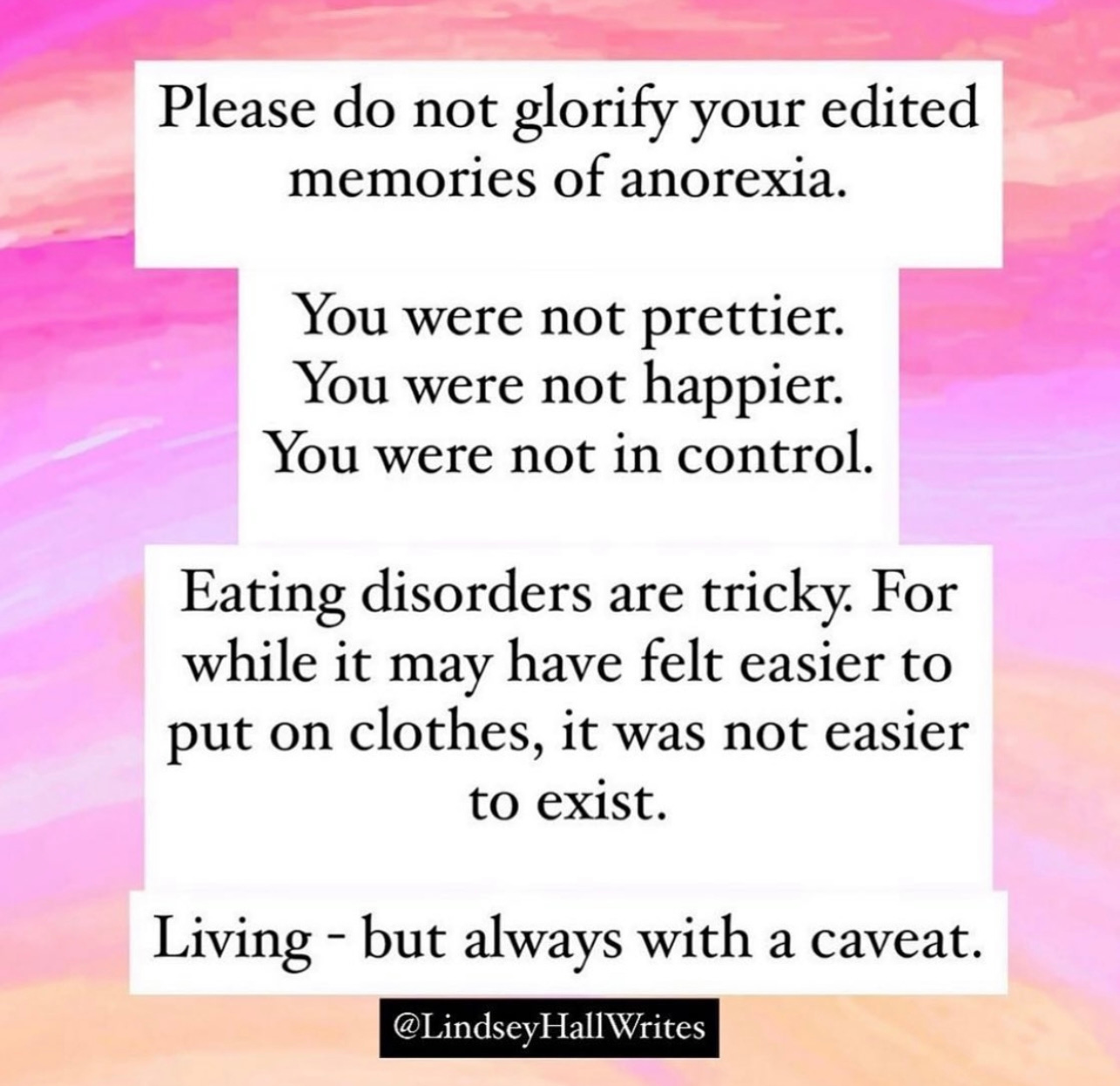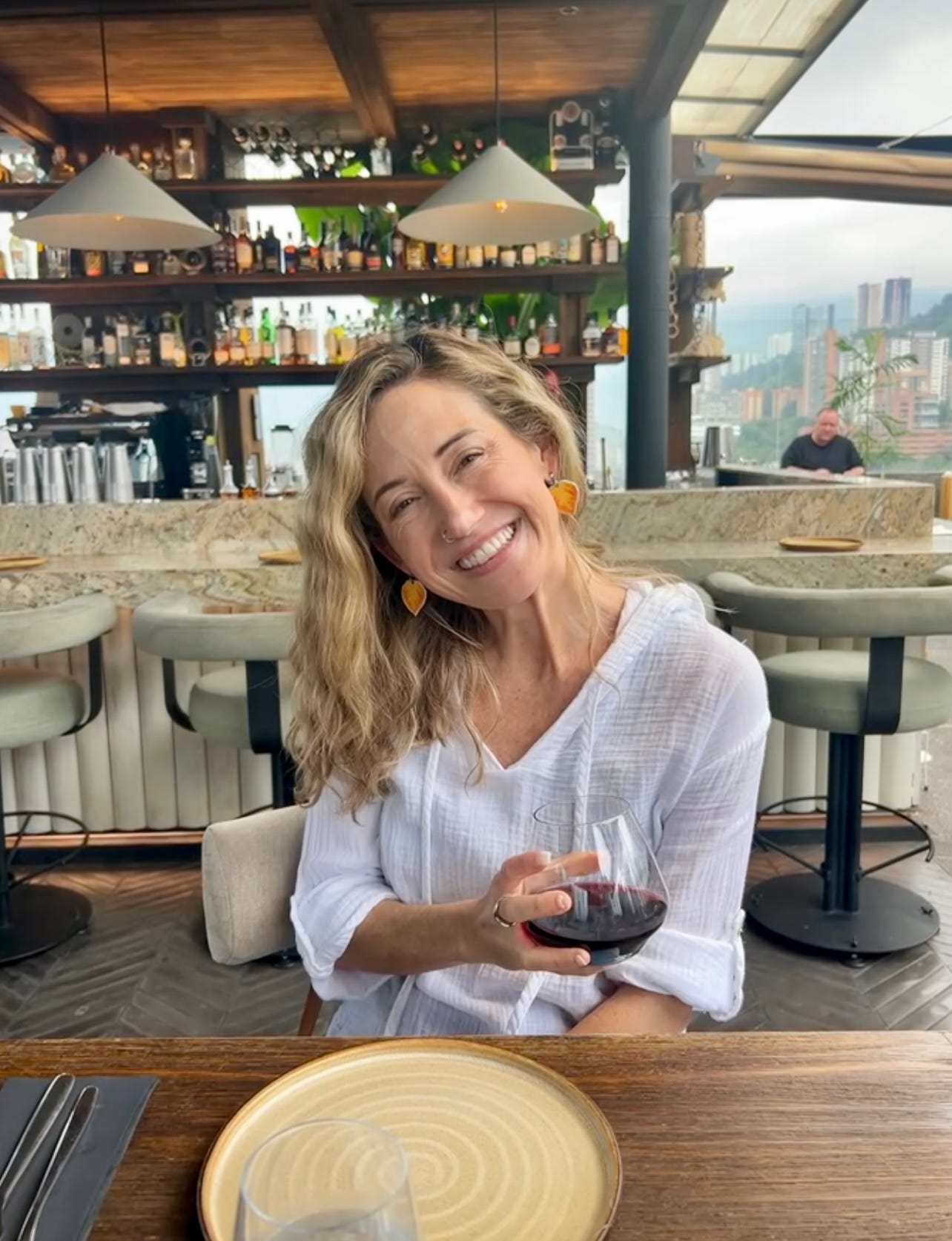Everything you think you miss about anorexia is an edited memory.
In light of Eating Disorder Awareness Week, which ends tomorrow, here are some perspectives to take with you
I’ve been having a good ole time going through my old quotes on Instagram that I wrote between 2016-2020.
While I haven’t been writing a ton lately about my recovery or past with my eating disorder(s), it did feel refreshing to go through and read comments from the past.
It’s a damn nice thing to have community. And I feel grateful to have had the one I had on socials for quite some time.
Anyway, I wanted to share a wrap up of some of the perspectives that over the years seemed to resonate with people.
Hopefully they relate, or you know someone who it might relate to.
Sending hugs - we all in this recovery shiz together.
1. “Everything you think you miss about Anorexia is an edited memory.”
2. “Our bodies biologically, unequivocally have to eat to survive.
So, when someone asks what eating disorder I had, I make a point to explain that I lived in the ‘cycle of an eating disorder.’
It’s rarely just anorexia.
It’s rarely only bulimia.
It’s not always binge eating.
I under-ate then overate then over exercised then binge ate and purged, while drunk or sober. Alternating hour by hour. Day by day.
A parent asked me once “my child says she has anorexia but she doesn’t really look like it. Don’t you think she’ll grow out of it? I remember being her age and going through that phase.
I took a moment to respond and I believe it holds true today. I said:
“I think it’s about looking at the bigger picture. Do you want to wait to find out? Is that the end goal? To see if she gets sick enough that you “notice” it, damages her organs, be so far in the cycle that it’s harder to get out of for her?
I don’t blame the parents, mind you. People will do anything, no matter how ignorant-seeming, to avoid facing painful truths.
But, with eating disorders, we can’t keep returning to the lowest hanging fruit of “isn’t this just a phase?” Or “well, you eat now right?” Or “I’ll just do it now and stop later.” Or “you don’t look like you had one.”
The purgatory of an eating disorder is the cycle.
Completely unsure whether you deserve help or need it because your symptoms or behaviors vary through time, your lifestyle erratic.
Occasionally, you still laugh.
You still socialize.
You still go to work.
You raise a family or take care of your pet.
Sometimes, you don’t over exercise or exercise at all.
Life — but always with a caveat.”***
2. “There will likely never be a day that I don’t think about anorexia or an eating disorder.
She is woven into me, a history.
She wears on me in scars and wrinkled form cigarettes.
She signals in knee pains and a missing molar
And she temps me in holidays.
Yet, I am still grateful to her. For she is a reminder of all the years I lived with her — and the days I lost.
And I am patient with her, because she whispers to me, still:
To live, but with a caveat, is that any life at all?”
3. “Please do not glorify your edited memories of anorexia.
You were not prettier.
You were not happier.
You were not in control.
Eating disorders are tricky. For while it may have felt easier to put on clothes, it was not easier to exist.
Living — but always with a caveat.”






4. “One of the many reasons the cycle of an eating disorder keeps people in it is because it does not necessarily feel extreme or terrible every single day. It feeds the belief that maybe you don’t actually have a disorder because you ate some “bad” food yesterday or perhaps you didn’t do that one work out a few days ago.
The cycle of an eating disorder will tell you that you partied with friends, and you ate last night and even though you feel guilty and full of shame and you’re trying to starve the next day to “make up for it”, it’ll tell you that you’re really just being “intuitive” about what you eat. And that you deserve the punishment.
The cycle of an eating disorder will insidiously remind you of that day a few weeks ago that you didn’t feel bad. Of the time you wore a swimsuit a month ago and felt false confidence (cause of course you didn’t feel it all day). Of the few times you stepped on a scale during that one week and felt a rush of endorphins. Of the compliments from friends at that one party recently.
But it will not take into account the pain you’re feeling while ruminating on those memories. Or the lengths you’re going to take in this moment to try to get back to that fleeting feeling.
What makes the eating disorder cycle so insidious is that it disregards the reality of living your life with a caveat.
That you will be there for your life but not really able to participate in it.
And, at some point in my eating disorder life, I started to truly understand that that was the tragedy.”
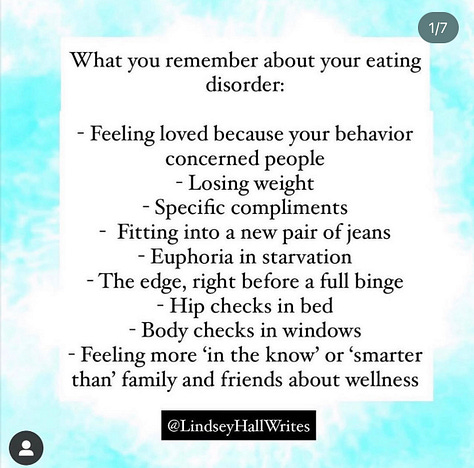
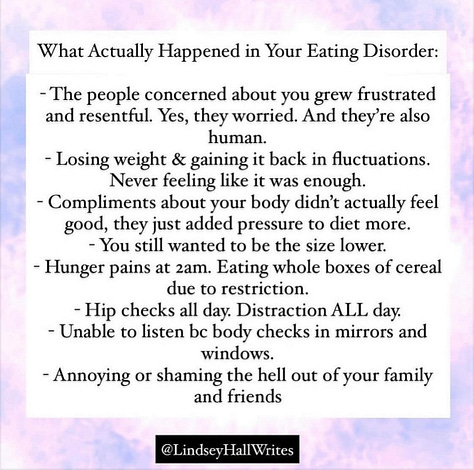
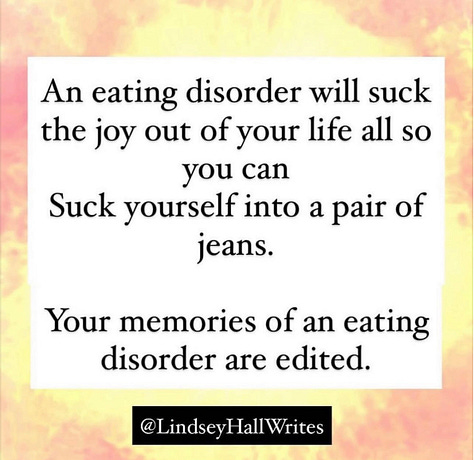
5. “What you remember about your eating disorder:
Feeling loved because your behavior concerned people
Losing weight
Specific compliments
Fitting into a new pair of jeans
Euphoria in starvation
The edge, right before a full binge
Hip checks in bed
Body checks in windows
Feeling more ‘in the know’ or smarter than family and friends about wellness
What actually happened in your eating disorder:
The people concerned about you grew frustrated and resentful. Yes, they worried. And they’re also human.
Losing weight and gaining it back in fluctuations. Never feeling like it was enough.
Compliments about your body didn’t actually feel good, they just added pressure to diet more.
You still wanted to be a size lower.
Hunger pains at 2AM. Eating whole boxes of cereal due to restriction.
Hip checks all day. Distraction ALL day.
Unable to listen because body checks in mirrors and windows.
Annoying or shaming the hell out of your family and friends
An eating disorder will suck the joy out of your life all so you can suck yourself into a pair of jeans.
Your memories of an eating disorder are edited.”
Cheers <3
*** side note: I seemed to really love the word “caveat” back in the day






